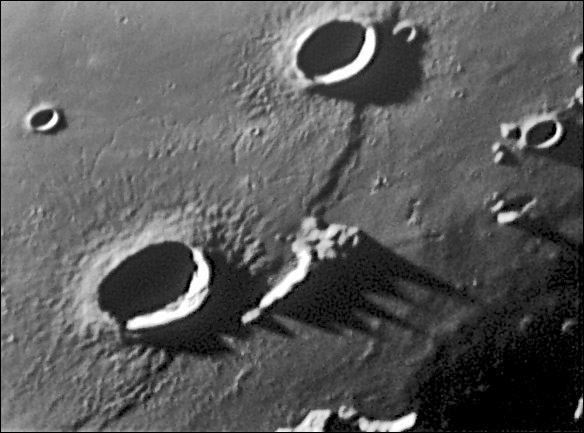
image by Bruno Daversin
With hyper-resolution every piece of the lunar surface offers a new story. Here in western Mare Imbrium are two craters, Delise (diameter 25 km) and the slightly smaller Diophantus (18 km). Bruno Daversin’s south up image shows them nearly full of shadows, surrounded by their ejecta’s roughness. Near the center of the image a short ridge and peak prosaically named Delisle Mountain, cast extreme shadows. Many years ago Ewen Whitaker informally called this feature The Baby. With some little imagination you can see the big head, two arms out in front and a slim torso, all stretched out as the child crawls southward along a mare ridge. Immediately above the Baby’s head is a delicate, zig-zaggy rille that winds its way eastward pass the small crater Diophantus B at the far left. This Diophantus Rille is very difficult to observe, even on the Lunar Orbiter image. The rille seems to start (or maybe end?) just south of the Baby’s head, but there are faint hints that it may come from what may be two very low domes to the right of the head. The most conspicuous slight swelling has a rimless summit pit with a rille-like feature disappearing into the peak’s shadow. A second possible dome, just above this one, is topped by a round pit and an elongate one. Are these really domes and is one of them the source of the rille?
Technical Details:
Ludiver Observatory 600 mm (24″) Schmidt-Cassegrain + webcam + IR filter. Bruno submitted a nicely toned image, but CAW enhanced it more to better bring out the rille.
Related Links:
Rükl chart 19
Ludiver’s Moon photos
Lunar Orbiter IV view
Yesterday's LPOD: Limb Strip
Tomorrow's LPOD: The Cassini Triangle
COMMENTS?
Register, Log in, and join in the comments.



